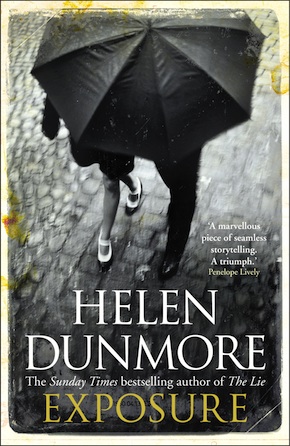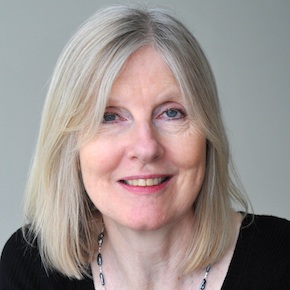Intrigue and discovery
by Helen Dunmore
“A gripping, subtle, emotional novel.” Sadie Jones
Helen Dunmore’s latest novel Exposure is a spellbinding, multilayered tale of love, betrayal, vulnerability and fierce loyalties at the height of the Cold War. As spy fever dominates the news headlines a sensitive government file goes missing and a swift arrest is made, but recent events suggest a cover-up. She lets us in on her writing secrets.
Where are you now?
I’m in St Ives, Cornwall, looking out of the window at the sea. (And touch-typing this.)
Where and when do you do most of your writing?
In my studio, where I can work undisturbed. However I write in many other places, and long train journeys are excellent for writing.
If you have one, what is your pre-writing ritual?
I walk to my studio. Walking is very much part of my writing life and if a passage is not going well I’ll often take a long walk and see how it resolves itself.
Full-time or part-time?
Full-time.
Pen or keyboard?
I write some notes and early bits of drafts by hand, and often write the first draft of a poem by hand. However I am left-handed and my handwriting was never very lovely or legible – probably because at school we were taught a handwriting style which works better for right-handed people. I started to type when I was about ten, and later did a full typing course. This was one of the most useful things I ever did.
How do you relax when you’re writing?
I don’t think the two things are compatible.
How would you pitch your latest book in up to 25 words?
Set during the Cold War, this is a novel about betrayal, secrets and a woman’s desperate struggle to protect her family as danger closes in.
Who do you write for?
While I write, it’s for the book itself. Afterwards I want to know what the reader makes of it within his or her imagination.
Who do you share your work in progress with?
I rarely talk about it. It’s all too easy to talk away a book, rather than writing it.
Which literary character do you wish you created?
This is a tricky question, because part of the pleasure of reading is discovering characters I could never have imagined, voices I’ve never heard before, and styles which are a revelation. I know that I could never have created, for example, Natasha Rostova in War and Peace, Elizabeth Bennet in Pride and Prejudice, Jane Eyre, Monroe Stahr in The Last Tycoon, Lucky Jim or Scrooge, and that’s why they give me so much delight – and illumination.
Share with us your favourite line/s of dialogue, poetry or prose.
I have too many favourites, but the following passage is one I have loved for a long time. It’s taken from Keats’ last known letter, which was written to his close friend Charles Brown not long before Keats’ death at the age of twenty-five in 1821. He died of TB, and had earlier nursed his brother Tom, who died from the same disease. Keats’ generosity, courage and wit shine through the letter, and at the end he makes a very moving, direct farewell:
“I can scarcely bid you goodbye, even in a letter. I always made an awkward bow. God bless you!”
Which book do you wish you’d written?
Perhaps a children’s classic such as Finn Family Moonintroll – but no-one else could ever be the great Tove Jansson.
Which book/s have you most recently read and enjoyed?
Dora Bruder by Patrick Modiano. Modiano won the Nobel Prize for Literature in 2014, but – shamefully – I’d never read any of his books until now. This is a sombre, intensely atmospheric novel about the disappearance of a young girl in Paris during the Occupation.
What’s on your bedside table or e-reader?
At Hawthorn Time by Melissa Harrison, which I’ve almost finished and like very much. It begins with an accident which involves three people, of whom one will die. But which one? And how did the three come together here one Spring dawn? I wanted to chase to the ending, but I also wanted to slow down to enjoy the writing.
Which books do you feel you ought to have read but haven’t yet?
I don’t think that the words ‘ought’ and ‘read’ belong in the same sentence.
Which book/s do you treasure the most?
Ones which belonged to people I love. I like inscriptions, little notes, memories of the way they read as well as what they read.
What is the last work you read in translation?
Elena Ferrante’s novels of Naples – like everyone else!
Which story collections would you particularly recommend?
I love Alice Munro’s short stories – Dear Life, perhaps. Rudyard Kipling is much under-estimated now, but his technique is brilliant and stories such as ‘The Wish House’ or ‘The Gardener’ are also deeply moving.
What will you read next?
Syriza: Inside the Labyrinth by Kevin Ovenden. I would like to know more about what led to the collapse of the Greek economy and the reaction against ‘austerity’. My husband is reading Syriza at the moment and has been talking about it – I love word-of-mouth recommendations.
What are you working on next?
I am not sure yet. I’m in the late stages of writing a novel and the one after that will take a long time to form.
Imagine you’re the host of a literary supper, who would your dinner guests be (living or dead, real or fictional)?
I would like to listen to the dead. Imagine meeting Charlotte Brontë… She would be rather silent and probably very critical but at least I’d see her ‘great, honest eyes’. Keats, obviously, because he would be irresistibly enchanting in his conversation. And he would be curious about everybody else, which is not always the case with great men. Pushkin, Virginia Woolf, Edith Nesbit, Coleridge… Charles Dickens might give a reading after dinner. Young Tolstoy might bring a bear. I would serve the food, slip about from one chair to the next, and listen.
If you weren’t writing you’d be…?
If I had not been a writer I’d like to have been a gardener.
 Helen Dunmore is the author of fourteen novels including Zennor in Darkness, A Spell of Winter and The Siege. A Fellow of the Royal Society of Literature, her work has been translated into more than thirty languages. Exposure is published by Hutchinson in Hardback and eBook. Read more.
Helen Dunmore is the author of fourteen novels including Zennor in Darkness, A Spell of Winter and The Siege. A Fellow of the Royal Society of Literature, her work has been translated into more than thirty languages. Exposure is published by Hutchinson in Hardback and eBook. Read more.
helendunmore.com
Author portrait © Caroline Forbes

